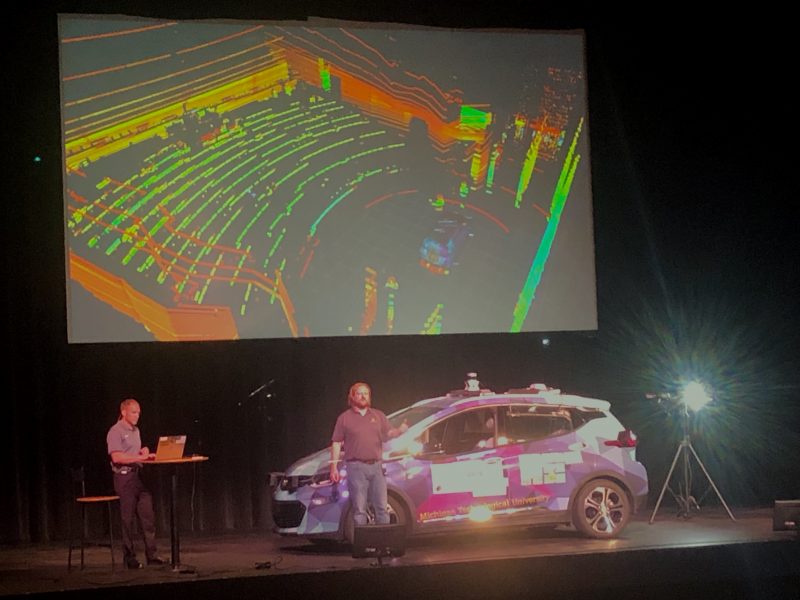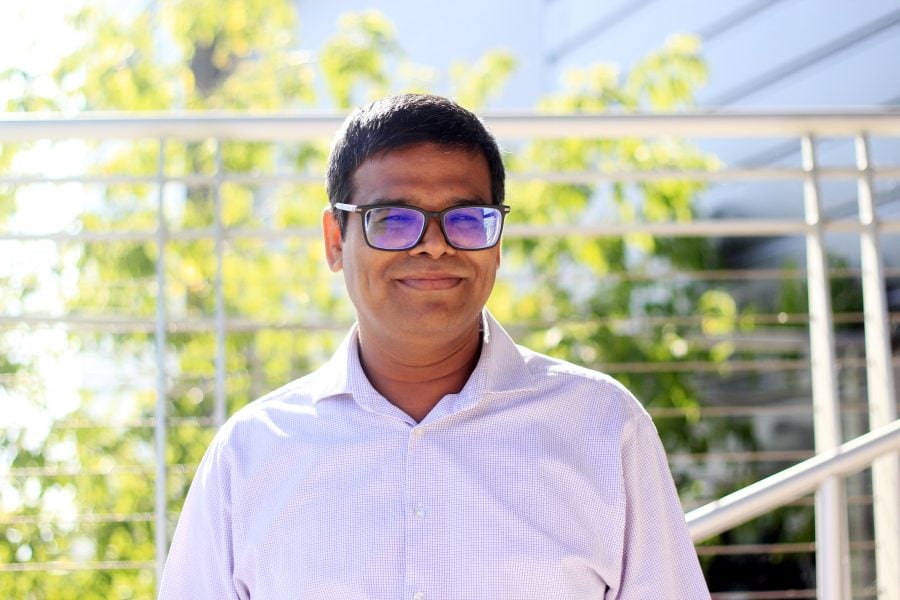
“We have a tradition at Michigan Tech of having a first-year lecture that helps students see how their technological education can help make a difference in the world,” says Janet Callahan, Dean of the College of Engineering. This year, 1,010 first year engineering students will be in attendance, the largest incoming class since 1982.
Jeremy Bos, assistant professor of electrical and computer engineering will deliver that lecture today, Thursday, September 9 at 6 pm.
Bos is also an alum. He earned a BS in Electrical Engineering at Michigan Tech in 2000, then returned to earn his PhD in Electrical Engineering and Optics in 2012. On campus he teaches a range of robotics courses, and serves as advisor and manager of several student groups. One of those is the Robotics Systems Enterprise (RSE). “Imagine an industry-driven team of students, seeking to seamlessly integrate exceptional knowledge in electronics, robotics, and programming to solve real world engineering problems,” he says.

RSE’s projects come in many shapes and sizes, from designing a vision system for work with a robotic arm, to an automatic power management system for weather buoys. Clients include Ford Motor Company and Michigan Tech’s Great Lakes Research Center. “We use more than just the skills and talents of computer science, electrical engineering, and mechanical engineering majors in RSE,” adds Bos. “All majors are welcome, just like in any Enterprise.”
Enterprise at Michigan Tech is when students work in teams on real projects, with real clients, in an environment that’s more like a business than a classroom. With coaching and guidance from faculty mentors, 25 Enterprise teams on campus work to invent products, provide services, and pioneer solutions.
Bos also serves as advisor to students taking part in the SAE AutoDrive Challenge. It all started four years ago, back when Michigan Tech was selected along with seven other universities to participate in the collegiate competition hosted by GM. Each was tasked with designing, building and testing a fully autonomous vehicle.
The Michigan Tech team started with a Chevy Bolt, outfitting it with sensors, control systems and computer processors so that it could successfully navigate an urban driving course in automated driving mode. They named their vehicle “Prometheus Borealis” after Prometheus, the Greek deity responsible for bringing technology to people, and Boreas, the purple-winged god of the north wind.
The entire team is made up of 40 students and two faculty advisors: Bos and co-advisor Darrell Robinette, an assistant professor of mechanical engineering-engineering mechanics. Their impressive expertise in autonomous vehicles and vehicular networks—and industrial automation and controls—combines for exceptional student mentoring.
The four-year challenge wrapped up this summer on June 14, with Michigan Tech earning 3rd place overall and bringing home the second-most trophies. Soon after, SAE International and General Motors (GM) announced the 10 collegiate teams selected to compete in the next competition, AutoDrive Challenge II. Michigan Tech was on the list.
“My own contribution to this effort is called ‘Autonomy at the End of the Earth,’ says Bos. “My research focuses on the operation of autonomous vehicles in hazardous weather. Specifically, the ice and snow we encounter on a daily basis between November and April.”
“I ended up in engineering because I like to build things (even if only on a computer) and I like to solve problems (generally with computers and math).”
More about Dr. Jeremy Bos, in his own words:
“I was born in Santa Clara, California just as Silicon Valley was starting to be a thing. I grew up in Grand Haven, Michigan where I graduated high school and moved to Michigan Tech for my undergraduate degree. I liked it so much I came back twice. The second time was from Maui, Hawaii, where I worked for the US Air Force Research Lab. I now live in Houghton with my wife, and fellow alumna, Jessica (STC ’00). We have a boisterous dog Rigel, named after a star in the constellation Orion, that bikes or skis with me on the Tech trails nearly every day. When I have time I bike, ski, hike, kayak, and stargaze. I have even tried my hand at astrophotography at Michigan Tech’s AMJOCH Observatory. (A telescope, hopefully, soon to be another robot).”
Advice for First Year Engineering Students, from Dean Janet Callahan:
“You are part of a community. It’s all about connecting, and reconnecting. I’d like to encourage you to join a student organization or club. The friendships you form in college are important. The people you meet end up being part of your lifelong community. So, be hands-on. Be sure to make time to do extra things, besides studying…but also make sure you go to class and do all your homework, because you will learn by doing.”
“This year, due to the pandemic, in-person attendance is limited. Attend via Zoom using this direct link. No registration required. Visit mtu.edu/ef for more information.”
